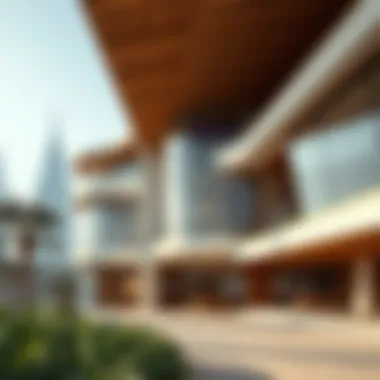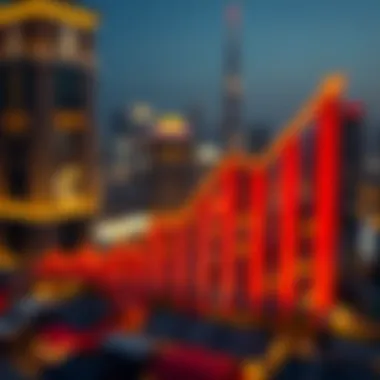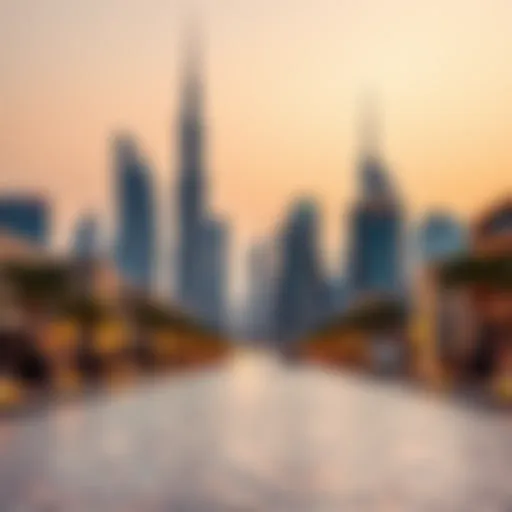Latest Trends in Dubai's Real Estate Market 2023


Intro
Dubai's real estate market is akin to a whirlwind, filled with constant motion and dramatic shifts. As a global hub for business and tourism, it attracts a multitude of investors, agents, and home buyers looking for opportunities that blend wealth, luxury, and innovation. In this guide, we will break down the latest trends, identify investment opportunities within emerging neighborhoods, and analyze the current market landscape.
The fascinating architecture and magnificent developments turn heads and captivate imaginations. Yet, it’s not just about striking silhouettes on the skyline; it’s also about understanding the dynamics that govern this ever-evolving market. The economic factors influencing property values, the latest architectural trends, and emerging localities all play crucial roles in shaping future investments.
Purchasing a property in Dubai can be a lucrative endeavor, but only for those who can navigate these new waters with insight and knowledge. Through detailed discussions, we aim to enrich your understanding of key aspects of Dubai's real estate landscape, offering clarity in what can often seem like a chaotic marketplace. Buckle up, as we dive straight into the Market Trends that currently define this vibrant environment.
The Current State of Dubai's Real Estate Market
The real estate market in Dubai stands as a dynamic landscape, marked by fluctuations and trends that reflect broader economic realities. Understanding the current state of Dubai's real estate market is crucial for potential investors, buyers, and real estate agents alike. This section delves into pertinent elements, such as market trends, indicators, and external economic influences, providing a lens through which to examine the opportunities and challenges in this vibrant sector.
Market Trends and Indicators
Recent data shows that the property market in Dubai is experiencing a notable shift. An analysis of sales transactions and rental values reveals that there is now a preference for larger homes. Many individuals are opting for residential spaces that provide not just amply living areas but also integrated workspaces, catalyzed by the burgeoning trend of remote work. The allure of luxury properties remains intact, with high-net-worth individuals continually drawn toward high-end residential towers such as the Burj Khalifa and villas around Palm Jumeirah.
Property values, according to various sources, have seen a resurgence with some areas witnessing significant price hikes.
- Increased Sales Activity: The number of transactions jumped by approximately 50% recently, with demand particularly strong in suburban areas.
- Rising Rental Costs: Rental values have climbed, reflecting a tightening supply in popular neighborhoods. Areas such as Dubai Marina and Downtown Dubai are witnessing increased competition.
Positive market sentiment is further echoed in reported increases in mortgage lending, which points to greater consumer confidence. Investors are keen, compensating for past slowdowns by exploring opportunities that cater to the evolving preferences of tenants and homebuyers.
“The current trend indicates a robust demand for properties that align with post-pandemic lifestyle changes, integrating work and leisure within residential settings.”
Impact of Economic Factors
Global economic factors intricately affect the local real estate landscape. As Dubai is not economically isolated, fluctuations in international oil prices, tourism trends, and geopolitical developments have direct consequences here. For instance, the recent rebound of tourism, fueled by successful vaccine rollouts and eased travel restrictions, has invigorated both the hospitality and residential rental markets.
- Tourism Recovery: The UAE sees millions of visitors each year, a fact that boosts both the short-term rental and hospitality sectors. This resurgence is vital as it provides a ripple effect, encouraging investment in commercial real estate as well.
- Investment in Infrastructure: The government has continuously invested in infrastructure projects, which enhances the appeal of various districts. New metro lines and enhanced public transport links to the Expo 2020 site are likely to boost nearby residential areas in terms of value.
Noteworthy New Developments
Dubai’s real estate scene never ceases to amaze with its constant evolution, and the latest developments are a testament to this dynamic atmosphere. The importance of featuring new projects cannot be overstated for potential buyers and investors. Understanding these noteworthy advancements not only sheds light on current trends but also offers insight into the future trajectory of the market, empowering stakeholders to make informed decisions.
Recent developments in Dubai are often indicative of larger economic trends, focusing on sustainability, luxury, and versatility. As urban habitats grow denser, the need for innovative and thoughtful design becomes evident. Investors looking to capitalize on these trends should consider the architectural innovations, sustainability efforts, and overall impact these projects have on community engagement and property values. The benefits of keeping abreast of these developments range from identifying the best investment opportunities to understanding the lifestyle preferences of a diversifying population.
Luxury Residential Projects
Dubai's luxury residential projects frequently feature distinctive designs paired with top-tier amenities, attracting affluent buyers both locally and internationally. One notable project is The Address Residence Sky View, which offers a panoramic view of the city’s skyline from its spectacular high-rise structure. Individuals hungry for exclusivity might also look towards the luxurious villas in Emirates Hills.
Moreover, the architectural craftsmanship involved in these residences often integrates cutting-edge technology ensuring a lifestyle that caters to both comfort and security. How these properties blend opulence with smart home systems allows residents to live seamlessly while maintaining control over their environments — a major selling point in modern real estate.
Commercial Spaces and Offices
As the heart of business activity in the region, Dubai is incredibly appealing to corporate entities. Significant new commercial complexes such as the Dubai Creek Tower Hub and the Dubai World Trade Centre are changing the landscape for commercial spaces. This enables adaptive uses of workspace, from traditional office setups to collaborative and flexible working environments.
Please note that with the shift towards hybrid work models, many developers are integrating multifunctional spaces within these office environments. This moves beyond mere aesthetics to accommodate a changing workforce's needs. Such foresight is vital for ensuring long-term viability in the competitive real estate sector.
Additionally, the influx of multinational companies setting up shop in these commercial spaces only reinforces Dubai’s position as a global business hub.
Mixed-Use Developments
Mixed-use developments are gaining traction in Dubai, reflecting an emergent preference for communities that blend residential, commercial, and leisure spaces. Complexes like City Walk and Mall of the Emirates are prime examples, offering residents and visitors a vibrant ecosystem of living, shopping, and entertainment options.
These developments provide significant advantages, such as reducing commute times and fostering a stronger sense of community. By combining housing, retail, and social spaces, mixed-use developments appeal to a wider audience, enhancing property values and attracting investments. A growing focus on pedestrian-friendly designs is crucial here; it encourages walkability, making these neighborhoods not just places to live, but places to thrive.
In essence, noteworthy new developments in Dubai's real estate market illustrate a profound shift towards integration, luxury, and sustainability. Staying updated on these projects equips stakeholders with the knowledge needed to navigate the vibrant market effectively.
Emerging Neighborhoods in Dubai
As Dubai's skyline continues to evolve, so too does its landscape of neighborhoods. Emerging neighborhoods are not merely about new constructions, but rather represent the city’s adaption to modern demands, cultural shifts, and the need for diversified living spaces. These areas are becoming prominent for a variety of reasons: affordability, innovative designs, and enhanced mobility options. Investors and potential buyers are paying close attention to these locations because they often promise higher returns as they attract new families and businesses.


Dubai Creek Harbour
Nestled along the banks of the historic creek, Dubai Creek Harbour is a remarkable embodiment of Dubai's commitment to blending modernity with tradition. This neighborhood is positioned to become one of the largest mixed-use developments in the city, offering a vibrant community feel. With its iconic view of the Burj Khalifa and a waterfront filled with parks and walkways, this area is becoming increasingly attractive to young professionals and families.
Investors here are drawn to the blend of residential and commercial spaces, fostering a lively environment that encourages interaction and commerce. The upcoming Dubai Creek Tower, poised to surpass the height of the Burj Khalifa, only adds to its allure. Being at the gateway to the city, the connectivity and transportation options are also substantial, with links to the metro and various road networks.
"Dubai Creek Harbour is a crossroads of tradition and innovation, providing a unique lifestyle experience for all who seek it."
Dubai Hills Estate
Dubai Hills Estate represents a new vision for suburban living. This neighborhood combines luxury residential living with lush green spaces and a mixture of retail establishments. What makes Dubai Hills stand out is its emphasis on community; the design integrates parks, trails, and recreational facilities to foster a sense of belonging.
For investors, the appeal of Dubai Hills Estate lies in its strategic positioning. It is centrally located, providing easy access to the downtown area and various key attractions. The Dubai Hills Mall is also on the horizon, promising not only shopping but entertainment and dining. The residential properties are designed with sustainability in mind, making this estate a forward-thinking choice for potential buyers.
The Valley
A fresh take on suburban living, The Valley offers a quieter alternative for those looking to escape the bustling core of the city. Positioned on the outskirts of Dubai, this neighborhood is marked by its picturesque views and spacious plots. The focus here is on family-oriented living with a range of amenities designed to cater to a slower-paced lifestyle.
What’s intriguing about The Valley from an investment standpoint is its affordability compared to other upscale neighborhoods in Dubai. As families move towards these peaceful locales, the property values are expected to appreciate over time, presenting a potential win-win for investors. Moreover, integration with technologies such as smart home options is becoming a standard, aligning well with the trend towards modern living needs.
Sustainability in New Developments
Sustainability is now a buzzword that resonates across the globe, but in Dubai, it embodies much more than just a passing trend. This vibrant city is transforming its real estate landscape, with sustainability embedded at its core, driving innovation and attracting attention from investors around the world. With environmental concerns growing, the incorporation of sustainable practices in new developments has become paramount. This shift not only addresses climate change but also enhances the quality of life for residents while promising solid returns for investors.
By integrating green building practices, developers are not just satisfying a market demand but are also enhancing the overall value of their properties. Sustainability in real estate, thus, emerges as a clear differentiator, allowing projects to stand out in an increasingly crowded market. The benefits of investing in sustainable developments are manifold; they include reduced operational costs, increased property value over time, and a favorable response from regulatory bodies.
As the Dubai government continues to push for sustainable initiatives, this focus ensures that real estate developers explore ways to meet these growing environmental expectations. Ultimately, understanding and adopting sustainable practices in new developments is essential for anyone looking to navigate Dubai's real estate market effectively.
Green Building Initiatives
In recent years, Dubai has made tremendous strides in the realm of green building initiatives. The Dubai Green Building Regulations, introduced by the Dubai Municipality, advocate for energy efficiency, water conservation, and environmentally friendly materials in construction. Builders are now increasingly required to adhere to these guidelines.
The benefits of these green initiatives go beyond mere regulatory compliance; they often result in cost savings that can incentivize developers and attract environmentally-minded investors. For example:
- Energy Efficiency: Buildings equipped with energy-efficient appliances and insulation methods significantly lower utility bills.
- Water Conservation: Innovative plumbing systems and rainwater harvesting techniques save water, aligning with Dubai's goals for resource conservation.
- Sustainable Materials: The use of recycled or sustainably sourced materials in construction not only reduces waste but also supports local economies.
These initiatives contribute directly to Dubai's overarching vision of becoming a leading sustainable city. The momentum around green building initiatives is not just a compliance issue; it's genuinely reshaping Dubai's urban environment.
Renewable Energy Solutions
The pivot towards renewable energy solutions signifies a transformative leap for Dubai's real estate market. As developers consider the long-term implications of energy consumption, incorporating renewable energy sources like solar power becomes less of an afterthought and more of a requirement. The UAE's Solar Energy Strategy aims for 44% of the energy mix to come from renewable sources by 2030, highlighting the urgency behind these shifts.
For new property developments, integrating renewable energy systems can yield impressive results. Here are a few reasons why:
- Solar Panels: Installing solar panels can significantly cut energy costs for residents and businesses alike, leading to greater attractiveness of properties.
- Net-Zero Energy Buildings: Developers are working toward projects that generate as much energy as they consume, showcasing a commitment to sustainability.
- Incentives: The government offers various incentives for adopting renewable technologies, easing the financial burden on developers.
Adopting renewable energy solutions reflects not only a commitment to environmental responsibility but also an awareness of market expectations. Buyers, investors, and tenants are placing greater emphasis on energy-efficient, sustainable buildings, making this a critical aspect of future developments in Dubai.
"Sustainable architecture is not a trend; it's a fundamental shift towards how we build for future generations."
As Dubai continues to embrace these sustainable methodologies, the real estate market stands poised for substantial growth and innovation in the years to come.
Investment Opportunities and Returns
In the ever-evolving landscape of Dubai's real estate market, investment opportunities offer a wealth of potential for both seasoned investors and newcomers alike. Navigating this terrain effectively can yield substantial returns, making it essential to understand the nuances involved. The focus here is on two primary sectors: residential and commercial investments. Both facets bring their unique offerings and challenges, influencing the decision-making process of investors.
Residential Investments
Residential investments in Dubai have been dynamic, reflecting the city’s continuous growth and changing demographics. From opulent villas in Palm Jumeirah to more affordable apartments in emerging neighborhoods, the variety caters to a diverse array of buyers.
- Market Demand: With a burgeoning expatriate population and a steady influx of tourists, the demand for quality housing has never been higher. This rising demand often translates into appreciation in property values, making residential investments appealing.
- Rental Yields: Investors in residential properties can expect enticing rental yields. In some areas, these yields can reach 7-8%, significantly higher than many global cities. This makes Dubai a hot spot for those looking to maximize their return on property investments.
- Long-term Growth Potential: The UAE government has been proactive in enhancing its infrastructure and urban planning. Projects like the Dubai Marina and developments in Dubai Creek Harbour are indicators of long-term growth, which bodes well for residential property values over time.
- Considerations: However, it is important to consider the fluctuations in demand. Economic conditions or changes in immigration laws could directly impact the market. Investors should stay informed about local regulations and market shifts to mitigate risks when making a purchase.


Commercial Real Estate Investments
Shifting focus to commercial real estate, this sector appears to be a pillar for investors looking for stability and high returns. Dubai’s strategic position as a global business hub elevates its commercial real estate investments above many other markets.
- Rental Income: Commercial properties, including office spaces and retail units, typically generate higher rental income compared to their residential counterparts. For commercial investors, the average yield can range from 8-10%, depending on the location and property type.
- Business Growth: The influx of businesses seeking to establish themselves in Dubai, especially in free zones, fuels the demand for commercial spaces. Areas like Downtown Dubai and Business Bay are particularly sought after due to their proximity to business districts and amenities.
- Diversification of Portfolio: Adding commercial properties to an investment portfolio can provide a hedge against volatility in residential markets. A well-balanced mix of residential and commercial assets can stabilize cash flow and enhance overall returns.
- Factors to Watch: Although the commercial sector appears robust, external factors like economic downturns can create challenges. Investors ought to perform due diligence on potential tenants and market conditions before sealing any deals.
"Investors should always have an eye on the bigger picture, tracking trends over time is crucial for navigating the complexities of the market."
Ultimately, understanding the distinct dynamics of residential and commercial investments in Dubai not only reveals lucrative avenues but also equips investors with the necessary knowledge to make informed decisions. Keeping abreast of market trends, regulatory changes, and economic indicators is vital for achieving success in this vibrant real estate landscape.
For more insights into Dubai's real estate market, visit Dubai Land Department or reference data from the World Bank.
Investing in Dubai’s real estate market truly holds the keys to attracting both promising returns and long-term growth. As always, aligning investment decisions with market conditions ensures a smoother journey in the world of property investment.
Navigating Property Sales and Rentals
When delving into Dubai's real estate market, understanding the navigation of property sales and rentals is crucial. This element not only reflects the current dynamics of the market, but it also provides clarity to prospective buyers, investors, and renters. The complexities involved in these transactions demand attention, whether one is a seasoned investor or a first-time buyer.
Understanding Market Dynamics
The market dynamics in Dubai's real estate sphere are influenced by various factors, including supply and demand, pricing strategies, and buyer sentiment. The fluctuation of these factors can significantly affect property values. Investors should be acutely aware of how economic shifts can create waves in the market.
- Supply vs. Demand: A balanced market usually sustains reasonable property values. However, a sudden influx of new developments can saturate the market, leading to lower prices and, therefore, potential opportunities for buyers.
- Pricing Trends: Keeping abreast of pricing trends is essential. Understanding the average price per square meter in various neighborhoods will provide insights into where to invest.
- Buyer Sentiment: Many buyers relay on their instincts when purchasing property. Monitoring sentiment indicators through surveys or observing foot traffic in visited properties can act as a barometer.
To put it plainly, grasping these dynamics involves digging deeper than surface-level trends. Engaging with local analysts or utilizing online tools and resources can enrich this understanding. Platforms like Dubai Statistics Center or Bayut provide valuable data and predictive analytics to paint a clearer picture.
Using Real Estate Agents Wisely
Navigating through property sales and rentals might prompt individuals to seek assistance from a real estate agent. However, not all agents play by the same rulebook. When choosing an agent, several considerations come to the forefront:
- Expertise in Dubai's Market: It is paramount to select agents who have a track record in Dubai’s niche markets, as they can offer insider knowledge. Their understanding of various neighborhoods and trends could tip the scales in favor of the buyer or seller.
- Transparent Communication: An effective agent will prioritize communication. They should actively keep clients informed at each step, ensuring expectations are aligned.
- Client Testimonials and Reviews: Researching previous clients' experiences can offer a glimpse into the agent's effectiveness. A quick check on platforms like Google Reviews can provide insight into their reputation.
Ultimately, a real estate agent should act as a guide rather than just a facilitator. Building a rapport where your needs are understood puts you on the right track in making informed decisions.
"Navigating property sales and rentals isn’t just about transactions; it’s about laying the groundwork for future prosperity."
Regulatory Framework Impacting New Developments
The regulatory environment plays a pivotal role in shaping Dubai's real estate market. Understanding this framework is not just a formality; it's a necessity for all stakeholders involved. For investors, agents, and buyers alike, being familiar with property laws and government policies can save time, money, and hassle. This section sheds light on essential components of this framework, emphasizing its implications for new developments.
Understanding Property Laws
At the heart of Dubai’s real estate landscape lies a complex web of property laws. These regulations dictate how properties are bought, sold, and rented. One significant component is the Real Estate Regulatory Authority (RERA), which enforces laws and standards that promote transparency and protect investors.
One needs to understand several key elements of property laws:
- Ownership Types: In Dubai, properties can be owned freehold or leasehold. Freehold gives full ownership rights to buyers, while leasehold means the property is leased from the owner for a fixed term.
- Title Deeds: Essential for proving ownership, title deeds must be registered with RERA to grant legal recognition to any transaction.
- Dispute Resolution: The increased number of disputes in real estate transactions necessitates having structured mechanisms in place. RERA oversees a dispute resolution center specifically for real estate conflicts.
Navigating these property laws can be challenging. It's crucial for potential investors to familiarize themselves not only with the local regulations but also with how they interact with broader regional and global laws.
The Role of Government Policies
Government policies are instrumental in fostering a robust real estate market in Dubai. The authorities have put measures in place that not only protect investors but also stimulate growth.
Key areas of government involvement include:
- Affordable Housing Initiatives: The government has launched programs aimed at increasing the availability of affordable housing, tackling the rising cost of living for residents.
- Visa Reforms: New policies providing long-term residency for investors have significantly boosted foreign investment. Individuals investing a substantial sum in real estate can now obtain long-term visas, which was not the case a few years back.
- Economic Diversification Policies: These policies aim to move Dubai away from its oil-dependent economy. With a focus on sectors such as tourism and technology, these initiatives influence the type of developments being promoted.
"Understanding the regulatory landscape is crucial for investors looking at new developments in Dubai."
As new projects roll out, it’s vital for developers and investors to keep abreast of ongoing changes in government policies. Adapting to these can be the difference between success and failure in this competitive market.


In summary, a clear understanding of the regulatory framework impacting new developments makes the journey through Dubai's real estate market smoother. The specifics of property laws combined with proactive government policies assure that Dubai remains an attractive destination for both local and international investors.
Cultural Shift in Dubai Living
In recent years, Dubai has seen notable transformations in its social fabric, influenced significantly by an ever-growing and diverse population. This cultural shift is pivotal not just for the residents but also for investors and developers keen on understanding the nuances of this vibrant market. As the city expands, embracing a multitude of cultures, it brings new challenges and exciting opportunities that can impact property values and demand.
Adapting to Increasing Diversity
Dubai’s metamorphosis into a global hub has ushered in a blend of cultures, languages, and traditions. This diversity is apparent in the food, fashion, and cultural festivals celebrated throughout the city. For investors and developers, responding to this evolving demographic landscape is crucial. Here’s why:
- Market Demand: With a diverse population, there’s a growing demand for various housing options. For example, expatriates from South Asia may prefer compact apartments close to commercial hubs, while Western expatriates might look for upscale villas in quieter neighborhoods.
- Cultural Amenities: The rise in multiculturalism has fostered the development of amenities tailored to various groups, including international schools, mosques, and community centers. These spaces enhance lifestyle appeal for prospective buyers and renters.
- Community Building: Developers are increasingly focusing on inclusive communities, allowing residents from different backgrounds to coexist and interact. This not only bolsters social harmony but also enhances property desirability.
The ability of the real estate sector to cater to such an array of cultural needs will likely dictate future growth and opportunities.
Integration of Public Spaces
Another facet of the cultural shift in Dubai is the emphasis on integrating public spaces within urban development. Such areas are not merely parks or plazas; they serve as vital hubs for community interaction. These spaces play a significant role in enhancing the quality of life, and here’s how:
- Encouraging Social Interaction: Public spaces facilitate gatherings, fostering a sense of community. From farmers' markets to outdoor movie nights, these events encourage residents to mingle, making neighborhoods more attractive to potential buyers.
- Enhanced Urban Aesthetics: Well-designed public spaces elevate the visual appeal of areas, which can increase property values. Projects like the Dubai Marina waterfront promenade showcase the city’s blend of functional design and leisure, appealing to affluent investors.
- Sustainability and Health: With an increased focus on green initiatives, integrating parks and recreational areas helps promote healthier lifestyles. These aspects resonate particularly well with younger generations who prioritize wellness and environmental sustainability.
Public spaces are more than just spots for leisure; they are the beating heart of communities, reflecting the cultural tapestry of the city.
The Role of Technology in Real Estate
In today’s fast-paced world, technology is no longer a luxurious addition; it's an essential element of the real estate sector. For investors, agents, and buyers, understanding how technology impacts real estate is crucial. Enhanced efficiency, improved access to information, and better overall experiences stem from tech advancements. This section will delve into two significant components: proptech solutions and the role of smart homes and the Internet of Things (IoT).
Proptech Solutions
Proptech, short for property technology, includes every digital innovation that improves how real estate is bought, sold, managed, and experienced. The sector is growing like crazy, doubling down on efficiency in property transactions.
Here are a few notable proptech solutions currently redefining real estate:
- Virtual Reality and Augmented Reality: These technologies allow potential buyers to view properties remotely, offering immersive experiences that eliminate the need for physical visits. This can save time and resources while broadening the reach for sellers.
- Blockchain Technology: It simplifies many complex processes such as title transfers and transactions, bringing transparency and security. The elimination of intermediaries could lead to cost savings as well.
- Data Analytics: By leveraging big data, sellers and agents can analyze trends and understand buyer preferences, allowing tailored marketing to prospective clients. Making decisions based on empirical data rather than gut feelings significantly increases the chances of success.
These solutions not only streamline processes but also foster a more informed approach to real estate. As technology continues to evolve, the entire landscape of Dubai's real estate will undoubtedly shift, providing smarter options for both investors and buyers.
Smart Homes and IoT
The rise of smart homes, powered by the Internet of Things, marks a fresh chapter in Dubai's housing narrative. With technology embedded into residential properties, living experiences are being transformed.
Smart features you might find include:
- Smart Thermostats: These can learn your preferences and adjust heating or cooling accordingly, making homes more energy-efficient.
- Automated Security Systems: Integrated cameras and alarm systems can now be monitored remotely, assuring residents of their home’s safety regardless of where they are.
- Voice-Controlled Assistants: Connecting various home devices through voice commands adds a layer of convenience that fits well in the modern-day routine.
"Adopting smart technology in homes isn’t just about convenience; it can lead to a substantial reduction in energy costs and enhance property values."
The “smart home” trend in Dubai isn’t just a faddish feature; it's a growing preference among buyers, especially in luxury developments. Increasingly, developers are incorporating these amenities to appeal to tech-savvy consumers, providing added value and marking properties as desirable investments.
Future Outlook for Dubai's Real Estate
The future outlook for Dubai's real estate market holds significant importance as stakeholders navigate an ever-changing landscape. Being aware of upcoming trends and potential shifts can prepare buyers, investors, and real estate professionals for what lies ahead. Understanding the dynamics that influence this market is essential for making informed decisions. The Dubai real estate scene continues to evolve due in part to its strategic location, rapid urbanization, and robust governmental support.
Predictions for Market Growth
The predictions for market growth in Dubai's real estate sector seem set to soar. Analysts anticipate a steady upward trajectory fueled by several factors. Firstly, there is an influx of expatriates and foreign investors drawn by the tax-free environment and cosmopolitan lifestyle.
Additionally, developments in infrastructure, such as the expansion of the metro and improved road networks, are enhancing accessibility to various neighborhoods. This trend encourages both residential and commercial developments, leading to a populace eager to invest in property.
The upcoming Expo 2023, which aims to promote tourism and business opportunities, could serve as a catalyst for even greater demand. As the world focuses its attention on Dubai, stakes in the real estate market may very well rise significantly. Some key predictions include:
- Increase in property prices: Expect to see a gradual uptick in both residential and commercial sectors, particularly in emerging neighborhoods.
- Rise in rental yields: Investors may benefit from higher rental returns, especially in pre-leased commercial properties.
- Increased international interest: With Dubai's reputation as a global hub, foreign investment is likely to remain high, sustaining market growth.
Challenges Ahead
While the future may look promising, it's vital to acknowledge the challenges that Dubai's real estate market faces. A few roadblocks could hinder growth prospects and must be addressed appropriately.
- Market Saturation: With numerous developments on the horizon, there is a risk of oversupply, especially in luxury segments. This could lead to price corrections.
- Economic Uncertainty: External economic factors, such as geopolitical tensions or global economic shifts, could impact investor confidence and overall demand.
- Changing Consumer Preferences: Buyers today are increasingly seeking properties that offer not only luxury but also sustainability and community features. Developers will need to adapt swiftly to these preferences.
In summary, while predictions hint at a vibrant future for Dubai’s real estate market, both investors and developers must navigate the challenges diligently. Recognizing the balance between opportunity and risk is crucial to fostering sustainable growth.











